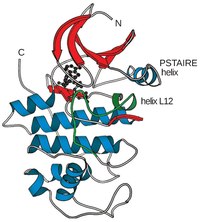
Photo from wikipedia
Microtubule affinity regulating kinase 4 (MARK4) becomes a unique anti-cancer drug target as its overexpression is responsible for different types of cancers. In quest of novel, effective MARK4 inhibitors, some… Click to show full abstract
Microtubule affinity regulating kinase 4 (MARK4) becomes a unique anti-cancer drug target as its overexpression is responsible for different types of cancers. In quest of novel, effective MARK4 inhibitors, some acridone derivatives were synthesized, characterized and evaluated for inhibitory activity against human MARK4. Among all the synthesized compounds, three (7b, 7d and 7f) were found to have better binding affinity and enzyme inhibition activity in µM range as shown by fluorescence binding, ITC and kinase assays. Here we used functional assays of selected potential lead molecules with commercially available panel of 26 kinases of same family. A distinctive kinase selectivity profile was observed for each compound. The selective compounds were identified with submicromolar cellular activity against MARK4. Furthermore, in vitro antitumor evaluation against cancerous cells (MCF-7 and HepG2) revealed that compounds 7b, 7d and 7f inhibit cell proliferation and predominantly induce apoptosis in MCF-7 cells, with IC50 values of 5.2 ± 1.2 μM, 6.3 ± 1.2 μM, and 5.8 ± 1.4 μM respectively. In addition, these compounds significantly upsurge the oxidative stress in cancerous cells. Our observations support our approach for the synthesis of effective inhibitors against MARK4 that can be taken forward for the development of novel anticancer molecules targeting MARK4.
Journal Title: Scientific Reports
Year Published: 2019
Link to full text (if available)
Share on Social Media: Sign Up to like & get
recommendations!